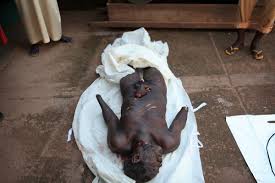
记忆方法
将“emasculate”分解为“em-”和“-ascalate”,其中“em-”暗示着“em-”前的词要经历某种变化,“-ascalate”源自拉丁语,表示“削弱”或“去除力量”。联想成一个场景:一个“king”(国王)被“-ascalate”,即力量被削弱,变得无权势,这样就可以记忆“emasculate”为“使失去力量”或“使无能”。
以上内容由AI生成, 仅供参考和借鉴
中文词源
emasculate 使无男子气的
e-, 向外。-masc, 男人,词源同 muscular,male. 即被阉割的。
英语词源
- emasculate (v.)
- c. 1600, from Latin emasculatus, past participle of emasculare "castrate," from assimilated form of ex- "out, away" (see ex-) + masculus "male, manly" (see masculine). Originally and usually in a figurative sense in English. Related: Emasculated; emasculating.
权威例句
- 1. The company tried to emasculate the unions.
- 公司试图削弱工会的力量。
- 2. Physically, she was of a pale, emasculate and unimportant structure.
- 就身体上说, 她肤色苍白, 身体柔弱,并不出色.
- 3. To remove the testicles of a male; geld or emasculate.
- 去除(雄性动物的)睾丸; 阉割或使无男子气.
- 4. Castrate: To remove the testicles of a male; geld or emasculate.
- 阉割: 去除(雄性动物的)睾丸; 阉割或使无男子气.
- 5. To deprive of virility or spirit; emasculate.
- 使丧失精力或精神; 使软弱.
